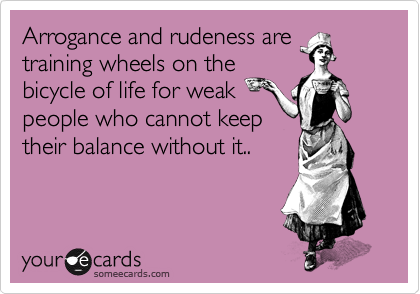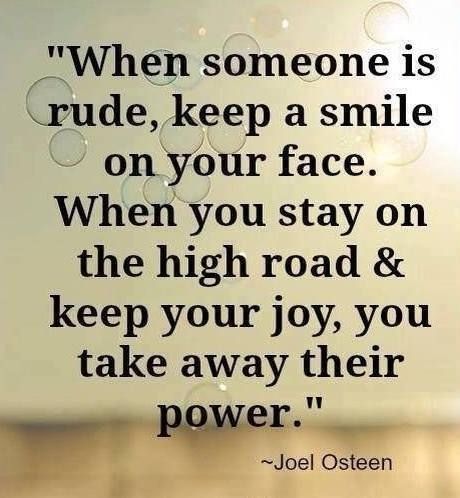
In our culture where rudeness is celebrated as the “new cool,” we find ourselves having to respond to rude behavior more often than we want. The key to dealing with rude people in understanding where they are coming from and managing our own emotions when we feel triggered by them. Learn four effective ways that you can deal with rude people with grace and tact, and prevent them from stealing your joy. (Estimated reading time: 5-6 minutes)
“Rudeness is the weak man’s imitation of strength.”
— Edmund Burke
When you’re out and about, there’s just no avoiding having to deal with rude people. You will be bumped into without apologies, cut off while driving, receive a mean email, or have a rant directed at you. You probably did, or said, something to which someone took offence.
The tricky thing about labelling rude behavior is that it is subjective, based on our personal and unique value systems. We consider someone’s behavior rude when it does not align with what we think is courteous and appropriate, and vice versa. In other words, what you find offensive conduct may be seen as being bold by another person.
But not everyone shares your core values, standards for manners, and personal character. Whether you’re at work or on a crowded bus, what we perceive as rudeness can often be unintentional. I’ve learned this the hard way during several conversations where my well-intentioned advice was seen as rude and insensitive by the recipient.
However, there are certain acts and behaviors that most of us can agree are outright rudeness. In these instances, it’s not a case of a bruised ego but about being disrespected. It comes from ignorance, being inconsiderate, not taking the time to think things through, or merely arrogance.

It doesn’t help that rudeness has become pervasive in our culture. Step out of the house and you’ll hear teens using cuss words, turn on the TV and you’ll see people shouting their lungs out on reality TV shows and use social media, and you’ll read mean comments directed at total strangers. Celebrities have even started reading mean Tweets sent to them out loud on comedy talk shows.
Because of the way rude behavior is glorified by pop culture, being rude has morphed into the new cool. An arrogant air of entitlement and a face of I-don’t-give-a-crap-about-anyone has become the social exterior that the youth of today are increasingly adopting. Applauding meanness has come at a high social cost.
There was a time when bad behavior was not accepted, and kids were held accountable. At the high school I attended, rudeness was not tolerated at any cost. My headmistress, a wise elderly lady, established a high standard for social behavior. She said, “the hallmark of good upbringing and class is being polite, courteous, and considerate of others.”
There’s a big difference between being a rebel and being rude. Being a rebel for a cause certainly has a coolness attached to it and can further your cause if you go about it in the right way. But rebels are motivated by values that are rooted in love and kindness. They don’t go around hurting others or being condescending while pursuing their cause. Their assertiveness may appear rude on the surface, but when you take a closer look, you’ll see that there’s depth.

Rude people, in contrast, are those who have picked up harmful patterns of behavior, have not learned basic good manners, or simply lack sensitivity. They lack a sense of empathy that allows them to step into someone else’s shoes.
As a society, we need to stop celebrating rudeness as the new brave. As individuals, we need to take a stand against rude behavior by becoming conscious of our offensive tendencies and calling people out on their behavior.
What may seem like innocent and innocuous acts of rudeness, which we’re often encouraged to brush off, can be toxic and damaging to others in the long term.
Maya Angelou said in an interview with Oprah that we can’t allow ourselves to be “pecked to death by ducks.” She said rude acts are “little murders” where people with take little pieces of you with their meanness.
“The minute I hear someone trying to demean me, I know that that person means to have my life. And I will not give it to them,” she said.
“When a person commits these little murders, and then you catch him or her at it, he or she might say, “Oh, I didn’t mean it.” But make no mistake: it is an assassination attempt!”
The only way to break the self-perpetuating cycle of rudeness and prevent it from taking away from our joy and peace is to handle that behavior with grace and tact.
Here are four steps that help you deal with rude people:
1. Manage your triggers: The first thing you want to do is remain calm when someone demonstrates rude behavior toward you. This can be hard, especially if you’re hurt and feel like you want to give it right back. However, those few moments are crucial because it can prevent a civil exchange from becoming a huge fight. Taking a few deep breaths, pausing, and clearing your mind will put you in a better state to respond rather than react.
2. Don’t take what they say and do personally: Remember that when a person is rude to you, it’s rarely about you. You are simply the one that the rude person has chosen to project their anger and frustration onto. If they call you names, make rude hand gestures, holler at you, or are just plain mean, it’s a poor reflection of them, not you. Your job is to build a backbone strong enough to protect you from their toxic energy. If you need to, speak about it to someone you trust – get it off your chest so that you don’t hold on to it.
3. Focus on gaining respect versus winning: You can’t control other people’s behavior, but you can control yours. No matter how rude the person is, it does not give us permission to act out and lose our tempers. It would only escalate the situation and make both people involved angrier. Instead, do your best to maintain your dignity and be a role model of respectful behavior. This does not mean that you have to be a pushover, you should be assertive and speak up for yourself. In this way, you avoid feeding into the negativity and drama.
4. Wish them well: Encounters with rude people are one of the best times to test our ability to empathize. It’s challenging to feel compassion toward someone who hurts you, but doing so can bring about a paradigm shift. They could be going through a stressful time tending to a sick parent or child, facing financial loss, or nursing a broken heart. Even if they are rude and snappy by nature, they probably faced some kind of past hurt or trauma to be so bitter. When you try to empathize, you’ll find it easier to wish them well and hope that they heal from their pain.
When all else fails, you can kill them kindness. It catches the rude person off-guard, and might even make them feel guilty about their behavior. Kindness is like sunlight that pierces through the dark clouds of rage and illuminates the truth of the matter. Ultimately, love is the only force that can help us transcend and be better people.
All my best on your journey,
Seline

Question for you: How do you usually deal with rude people? Is there anything that you would like to change about how you respond?
Did you like this post? Sign up below, and I’ll send you more awesome posts like this every week.

Thank you.
This is a post a lot of people need to see! I think many of the fights and arguments and acts of aggression and violence we see, could have been avoided if rude and angry people were just ignored. It is the number one cause of escalation of road rage- interacting with the person, flipping them off, and acting aggressively back to them. So if we all just chilled and ignored rude people and dealt with them in a better and safer way, things would be a lot better overall!